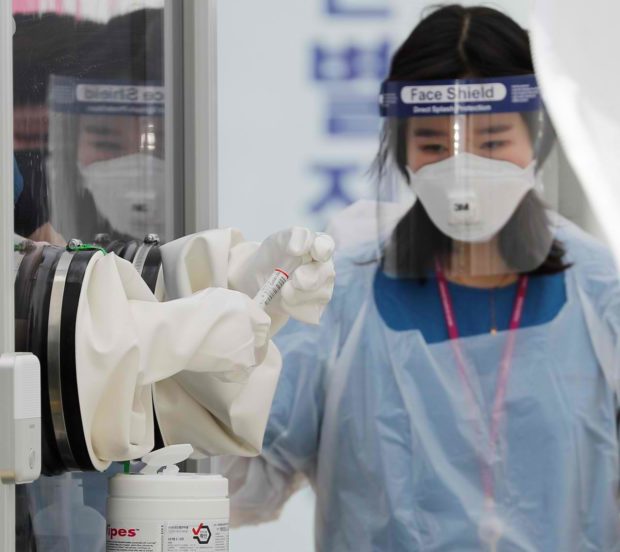SEOUL — The reopening of schools, which was scheduled for Wednesday for high school seniors, has been postponed in South Korea amid the specter of another wave of COVID-19 infections.
One-week delays in school resumption schedules, in stages spanning from this week through June 1, were announced Monday afternoon after at least 90 coronavirus cases were identified in a new cluster of infections that occurred in Seoul’s popular party district of Itaewon.
Health authorities expect the caseload to rise further, as thousands who may have been exposed to the pathogen there were out of reach.
As of 5 p.m. Monday, the number of new infections traced to night entertainment facilities in Itaewon had increased by 14 in 12 hours to 86, according to the Korea Centers for Disease Control and Prevention.
The first known patient in the Itaewon cluster was a 29-year-old man who visited five establishments in Itaewon on May 2, 3 and 5. They are King Club, Trunk Club, Club Queen, Soho and H.I.M.
KCDC Director Jung Eun-kyeong said this week is critical to minimize the spread of COVID-19 among high-risk groups that could cause serious damage.
“This mass infection has a high chance of turning into community transmission because it was young people who were mainly exposed to the virus this time. They don’t exhibit symptoms or only light ones, but they take part in social activities robustly,” she said.
Seoul Mayor Park Won-soon said the city decided to conduct anonymous testing for those hesitant to reveal their identities, fearing the possibility of the unwanted outing of their sexual orientation as their history of visits to gay clubs could be exposed to the public.
“To ensure personal safety, the city will preemptively conduct anonymous testing,” Seoul Mayor Park Won-soon said during a press briefing in the morning. Diagnostic tests will be provided free of charge.
For COVID-19 testing, examinees here are required to fill in personal details including their full name, address, gender, occupation and age.
But the city has allowed people in this case to leave only their phone numbers, so they can receive their test results, to ease privacy concerns.
For people who test positive, however, revelation of their identities is inevitable as the authorities collect personal details to trace the movements of individuals and people with whom they have come in close contact.
People who repeatedly ignore the city’s requests to undergo testing can face fines of up to 2 million won ($1,640).
The country’s implementation of a comprehensive testing and contact-tracing strategy helped it to flatten the curve to report zero local infections at some points, without lockdowns even in areas hit severely by the virus.
But the road to tracking down those who may have been exposed to the virus while clubbing is expected to be a bumpy ride.
Relatively low levels of tolerance toward lesbian, gay, bisexual and transgender people in Korean society appears to be hindering club visitors from coming forward and getting tested.
“Among 5,517 people on the visitor’s logs obtained by the city, we reached 2,405 but couldn’t do so with 3,112,” Park said. “This means they intentionally avoided our calls or wrote a wrong number in the first place.”
Prime Minister Chung Sye-kyun said the government will take active measures if Itaewon club visitors dawdle in cooperating with authorities.
“Our priority is to prevent further community spread of the virus in the metropolitan area. As speed is key in this matter, we have to discover visitors who are estimated to be several thousands and run tests on them,” he said.
Of 86 cases linked to the Itaewon sites, Seoul and surrounding Gyeonggi Province reported the largest numbers, with 51 and 21, respectively.
He directed municipal governments to mobilize all possible resources to identify club visitors as soon as possible and ordered the National Police Agency to promptly respond to requests from other organizations for cooperation.
Over the weekend, health authorities started to hand out credit card transaction data to city and provincial governments to trace the movements of individuals who visited Itaewon.
Starting May 6, the country relaxed its social distancing measures and brought citizens’ lives somewhat back to normal by allowing public museums and parks to resume operations while also preparing to reopen schools.
Faced with the Itaewon outbreak, governors and mayors have issued emergency administrative orders one after another for nightlife spots, including nightclubs and adult entertainment facilities, to suspend business.
On Monday, North Chungcheong Province announced a two-week suspension of business order for some 850 locations. South Chungcheong Province, Daejeon and Ulsan followed suit.
In the southern port city of Ulsan, those who transmit the virus to other people after concealing the fact that they visited clubs in Itaewon can be jailed for up to two years or fined up to 20 million won ($16,400).
